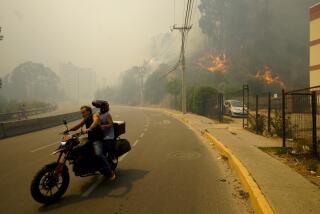Chaiten volcano erupts in Chile
- Share via
SANTIAGO, CHILE — A volcano that had been dormant for thousands of years shot hot ash into the stratosphere Tuesday, forcing the evacuation of a remote stretch of Chilean Patagonia.
The Chaiten volcano initially erupted Friday, prompting most residents to flee the nearby town of Chaiten, about 750 miles south of Santiago, the capital. On Tuesday, explosions boomed and officials said lava had been detected near the rim, prompting them to order everyone to leave the town, home to about 4,400 people.
Airborne ash crossed the Andes to neighboring Argentina, forcing the closure of roads and schools and disrupting flights in a wide swath of the country’s south.
“The volcano is exploding, so a total evacuation of the town of Chaiten has been ordered,” Chilean President Michelle Bachelet announced.
Military ships and aircraft were assisting in moving people from the thinly populated danger zone. Authorities called on holdouts and residents of far-flung ranches to leave.
Reports from the zone described Chaiten as a virtual ghost town covered in ash where only domestic animals roamed. Officials said there was no sign of lava cascading down the side of the mountain.
Video of the towering column of ash dominated television reports and were broadcast worldwide. The ash reached almost 20 miles high, according to the Ministry of Interior.
The narrow, elongated nation of Chile, wedged between the Pacific and the Andes, is one of the world’s most seismically active zones. It is home to more than 2,000 volcanoes, about 500 of which are considered active.
Experts were divided on how long the eruption would last and what would happen next. Some worried about potentially destructive currents of so-called pyroclastic flows, columns of hot gas and rock that can travel at high speeds.
Authorities also evacuated the town of Futaleufu. Many of the 1,000 or so residents already had fled to Argentina.
One of the most-affected populated areas was the Argentine town of Esquel, a winter ski center and home to 32,000 people. A fine white dust covered streets, homes and vehicles, according to news reports, and officials called a sanitary alert, closing schools and roads and distributing drinking water.
Doctors warned that breathing air contaminated with volcanic dust could cause bronchial and other problems, and the ash could irritate eyes.
Damage to agriculture and livestock in the area was likely to be substantial.
patrick.mcdonnell
@latimes.com
Special correspondent Vergara reported from Santiago and Times staff writer McDonnell from Puerto Suarez, Bolivia.
More to Read
Sign up for The Wild
We’ll help you find the best places to hike, bike and run, as well as the perfect silent spots for meditation and yoga.
You may occasionally receive promotional content from the Los Angeles Times.






